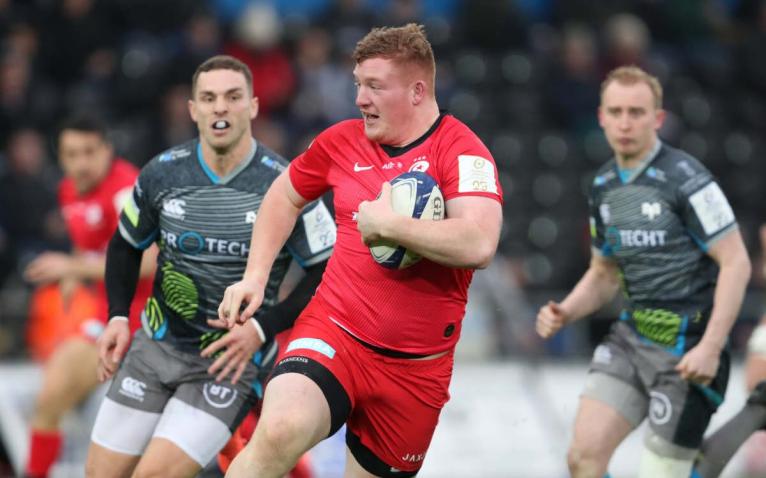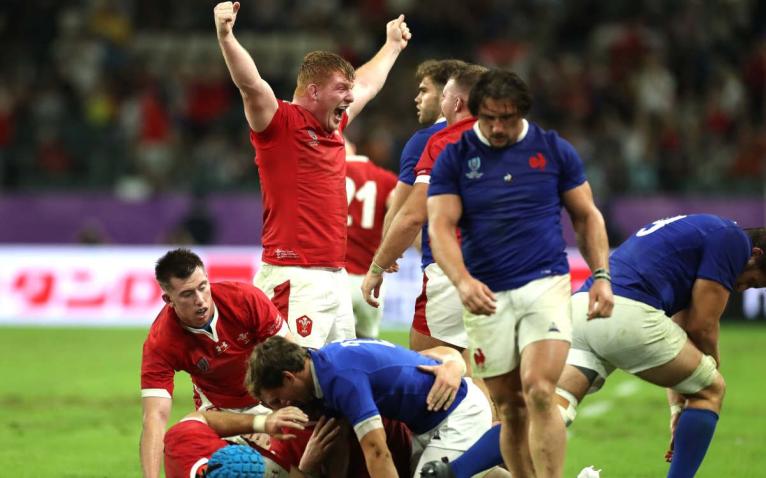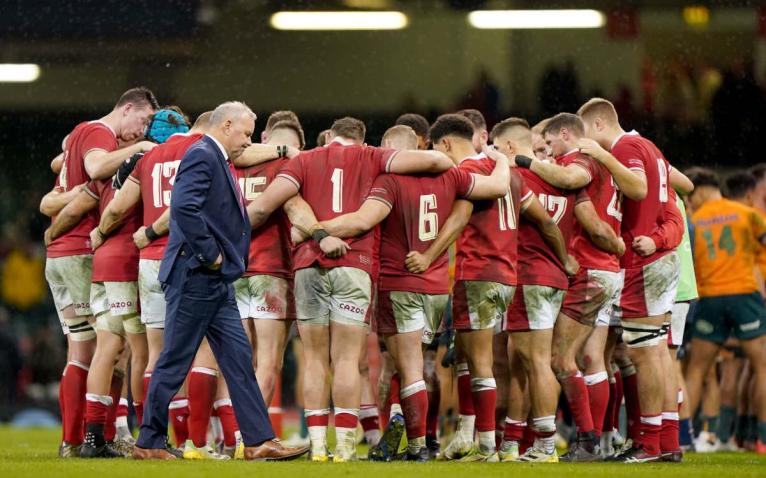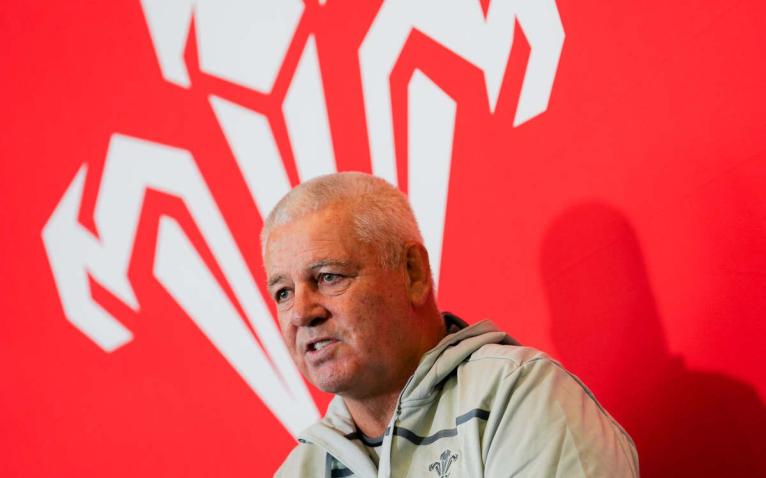A prop’s life is often one of unforgiving toil with little acclaim. The very best may enjoy a bountiful salary and a grudging respect among their peers. But they’re unlikely to be poster boys, or on the receiving end of lucrative endorsement deals. Their showreels are usually brief and consist mainly of collapsing scrums. That’s where Rhys Carre differs. His showreel is full of “wow” moments: surging, bullocking charges, bone-shuddering tackles, and scything running angles an inside-centre would be proud of. He’s also a handy purveyor of the jackal, and his shock of red hair and enormous stature means he’s easy to spot. A big man in a sport not short of big men. Which is precisely why so many Welsh fans were bemused at his omission from Wales’ Autumn Series squad. The then head coach, Wayne Pivac, acknowledged that he was capable of scene-stealing moments, but said they were a diversion from that fact that he wasn’t fit enough. Naturally, for someone who’d worked hard to become the first-choice loosehead at his club, Cardiff, the rebuke stung.
Relaxed and showered after training at the Arms Park, Carre – whose default demeanour is chilled and laid-back – recalls the moment with a rueful smile. ‘It’s not for me to say whether it was dealt with sensitively enough’ he says, referring to the fact Pivac went public with the reasons for dropping him. ‘The decision and how they went about it was out of my hands. My focus is always about playing here and doing well for Cardiff and if Dai (Young) is happy and picking me week-in, week-out, that’s all I can do. I can’t control what happens outside of this environment. They (Wales) might want something that I don’t offer which is fair enough, and there’s no argument to that.’
What does seem to grate are the constant references to his weight, and the assumption that there’s a direct correlation between bulk and fitness. Pivac and his Wales management team had given him a set of targets after the summer tour to South Africa, one of which was to shed 12kg. ‘I’ve had a lot of discussions and arguments over the years about my weight’ he says, ‘and sometimes it’s really got me down, focusing on how much I weigh in the morning. There was a period when it felt that that was everyone’s focus; what the scales say in the morning rather than what I do for the rest of the day. I tried to put that to one side and focus on what I was doing on the pitch.’
As he’s got older, he says he’s been able to rationalise more easily, and has learned to take things less personally, ‘I understand and agree that sometimes I’m not the fittest. I’m not the most “repeatable” prop out there, but what I do is effective and if I can do that a couple more times a game, then in a year or two when I get into my prime, I’m going to benefit massively from that.’

The Arms Park is a sanctuary for Carre. Somewhere he feels at home and where he’s been able to rebuild his confidence after the knock it took in the autumn. There’s a genuine sense of brotherhood at the club, a strong feeling that they’re playing for one another and the coaches. A feeling no doubt strengthened by the ongoing uncertainty over playing contracts, and the fallout from a drunken team social that garnered some negative press back in October.
Carre is quick to stress that he wasn’t among those reprimanded, but says the incident seems to have galvanised the squad and sparked a winning run that has seen them jostling around in the upper reaches of the URC table for most of the season. ‘This is my home’ he says proudly. ‘It’s where I grew up and where I’ve always wanted to play. I’ve had Dai’s backing this season, the first time I’ve had consistent rugby week-in, week-out and it’s helped massively. I’ve just been trying to repay Dai for that faith, to give back to the team, and do it for the boys really. If you’re winning, you’re happy, and if you look around here at the moment, you see a lot of smiles on faces.’
Pontypool’s legendary coach Ray Prosser famously had little time for what he regarded as showboating. A prop’s job was to push and to lift, and anything else was superfluous. When his protégé, Graham Price returned to Pontypool Park after his Wales debut against France, during which he scored a length-of-the field try, Prosser told him ‘you can’t have been scrummaging properly if you had enough energy to do that.’ Given Dai Young’s reputation as a gnarly, old-school tighthead you’d be forgiven for thinking he’d have the same attitude. But Carre is quick to point out that Young takes a more holistic view. ‘He understands that people learn things differently and that if he tried to imprint the way he played years ago when he was playing, it wouldn’t necessarily work today. He lets us go our own way and if he needs to tell us something, he’ll tell us. He’s given me the freedom to play the way I want to play’.
Mentally it’s hard, especially with scrums because every young prop, without exception, gets an absolute pasting at the start of their careers.
If that means issuing a licence to roam and get his hands on the ball, it’s not at the expense of the nuts and bolts: ‘Our scrum has definitely improved this year under Duane (Goodfield), and our back five has given us a really good platform to scrummage with. As a team, we’re giving away sloppy penalties and tries, but we’re not being driven back at all. It’s sloppy little errors (that we need to sort out), but we’re not getting dominated. I don’t think any team has dominated us this year, except maybe Ospreys during the first half, but we rectified it in the second half, which shows we’re willing to stick our heads in where it hurts and keep fighting. That’s something we’ve not done in the past.’
Carre admits this close-quarter stuff, where it’s about stealing inches in the scrum, rather than gobbling up metres in the open spaces, is what he’s struggled with in the past. Of all the positions on the rugby field, prop is the one with the steepest learning curve. ‘Mentally it’s hard, especially with scrums because every young prop, without exception, gets an absolute pasting at the start of their careers. You start in the Prem (Welsh Premiership) and you’re up against some 35-year-old bloke with a massive drum who’s played rugby for 20 years and who knows exactly what to do. It took me two or three years to get to grips with that, and only then was I ready to step up to professional rugby. It’s a massive environment change, especially going in and out of age grade.’ It was that part of the curve that was particularly difficult to negotiate.

At 6ft 3ins, and 21st stone, Carre often found youth rugby too easy. Accustomed to being bigger, stronger and more powerful than his peers, he didn’t feel the need to get nasty, or to cultivate the repertoire of cheats and tricks that eventually becomes the survival toolkit of every front-row forward. But as he discovered, a rude awakening awaits all those who make the transition: ‘You do really well at age grade, and then you come out and get absolutely drilled by someone. When I first came up against Fau (Filisie) in training, he absolutely drilled me. It’s to be expected but it’s hard to learn from. The reality is, you’ve got to go back to go forward, and until you accept it, it’s difficult to progress.’
Stepping up to professional level, Carre also came to realise that it’s not a one-size-fits-all approach, and that every prop develops their own set of foibles and idiosyncracies in order to improve. If scrummaging is an art – and anyone who’s ever shoved their head into the dark recesses of the front row insists it is – then the broadening of the palette is an ongoing project. ‘You have to learn your own way’ he asserts. ‘It’s not as easy as being told “this is what you do”. You have to learn what works for you and tailor your technique accordingly. I’m quite a tall loosehead and stuff I’ve learned from other players who aren’t as tall as me doesn’t actually work for me. I can’t get as low as most so against a short tighthead I’m likely to struggle because they can get lower to the ground than I can. That causes me problems. I’m still learning at 24, week-in, week-out in training I’m learning. We’ve got boys of different statures here so getting reps against different types of tightheads helps me so much.’ A layman might assume that a bigger man will always beat a smaller man in a pushing contest, but when it comes to scrummaging it’s never as simple as that. ‘Put a heavyweight against a lightweight on the floor, and you’d probably back the lightweight to move faster’ Carre says. ‘Scrummaging’s 1 to 8 as well. You could have a massive bloke in the pack but if he doesn’t want to scrummage, then (the scrum’s) not going anywhere.’
I’m a light-hearted character. I’ve tried to go the other way and act all tough, but I wasn’t happy. I felt trapped so I think this year and the end of last year I’ve stopped trying to be someone I’m not.
“I think every prop is a frustrated fly-half” he chuckles, when I ask if his desire to always be in the thick of it stems from a feeling there’s a back trapped somewhere within that massive frame. ‘I don’t think there are many of us who wouldn’t back ourselves. I like it when teams go forward, when I’ve got time to pick a line, and I know my ten’s going to look for me.’ Those eye-catching moments where Carre appears in the frontline of Cardiff’s attack, sending waves of terror through the opposition defence, don’t generally happen by accident. They’re the result of careful planning under the watchful eye of his attack coach, Matt Sherratt. ‘He’s given me set plays where I can get involved and get my hands on the ball,’ Carre explains. He’s helping me understand where and when I need to be, rather than just relying on sheer luck and hoping I’m in the right place at the right time. Jockey (Matt Sherratt) is helping me get myself in the right places more often, rather than running around like a headless chicken hoping I end up in the right place.’
This focus on an all-court game has helped Carre become more comfortable in his own skin. Adam Jones once told me that when he was part of that formidable Ospreys pack in the Galacticos era, he’d be the one to start the fights, safe in the knowledge that Richard Hibbard and Paul James would finish them off. In other words, despite being one of the world’s most feared props, he didn’t go much in for aggression and intimidation. Carre is the same; a lover not a fighter, but he admits he once felt the need to act tough in order to live up to a stereotype. ‘I’m a light-hearted character’ he explains. ‘I’ve tried to go the other way and act all tough, but I wasn’t happy. I felt trapped so I think this year and the end of last year I’ve stopped trying to be someone I’m not. Trying to be someone I thought I needed to be rather than being someone who I am.’ That someone would rather spend the warm-up knocking over drop goals, than staring out his opposite number. ‘The last ten months I’ve just done what I wanted to do, and that’s taken a bit of weight off my shoulders. As a player you’re getting told a lot of different things by a lot of different people and if you try to incorporate all of that it takes you away from who you are. A massive step for me was just before the summer when I realised I just needed to do what was best for me and what I feel is right.”

Speaking of the summer, that was the last time he pulled on the cherished red jersey. He replaced Wyn Jones in that ferocious first test against South Africa at Loftus Versfeld in Pretoria. A test Wales could, and perhaps should have won were it not for a flurry of yellow cards that neutered their challenge. They won a week later of course, becoming the first Welsh side ever to triumph on South African soil. Carre didn’t feature in that one, or the decider in Cape Town, but he speaks reverently about what a transformative experience it was to be part of that tour. That said, he’s fairly unsentimental when it comes to his personal memories.
‘Did it feel historic to me? Not really’ he says with an almost apologetic shrug. “We train every day and have done since we were 15, 16. That’s your job. You’re there to win a game. You have the mentality that you go out to win the game. It doesn’t matter who you play. Yeah, there’s history behind it, but at the end of day it’s a game of rugby. For us it’s a mentality thing: we’re winning this game regardless. Whether it’s Cardiff against the Dragons or Wales against New Zealand, you want to win every game you play. It was a great achievement and the boys put in a massive shift to get the “W” but as a team we expected it. We were pleased but we weren’t shocked. We expect to win.’ At a time when the game in Wales seems to be teetering on the verge of a full-blown crisis, this level of self-belief is admirable.
Wayne’s a great bloke. There’s no two ways about that. Obviously there were things going on above him that didn’t help, so I think the whole set-up wasn’t in a good place.
Carre on Wayne Pivac
Understandably, Carre is circumspect when probed about the fallout from the previous regime. When asked how the same squad can vacillate from winning a Six Nations to losing to Italy, to beating South Africa in Bloemfontein, to losing to Georgia a few months later, he takes a long, considered pause. ‘As a whole team, staff included’ he eventually says, ‘everyone had a tough year last year and we needed a change. I’m in no position to say who or what, but decisions were made and that’s professional sport. As a player you can get canned from a team as soon as the coach doesn’t want you, everyone’s a piece of meat. You’re wanted when you’re wanted and when you’re not you’re gone. It’s a cut-throat environment, especially international rugby. The details and the levels are so fine.’
It’s the same, it seems, for coaches. ‘One minute, in the summer you’re on cloud nine, making history and then a couple of results go the other way, and you’re falling on your sword.’ It’s a suitably oblique answer for a young man conscious of the need for diplomacy. ‘Wayne’s a great bloke’ he insists. ‘There’s no two ways about that. Obviously there were things going on above him that didn’t help, so I think the whole set-up wasn’t in a good place, and that didn’t help the players put in their best performances, which isn’t obviously isn’t an excuse but a settled workplace is a better workplace, and there’s a lot of things going on all the time behind the scenes which don’t help anyone.’ Carre arches an eyebrow as he realises he’s straying into the febrile arena of Welsh rugby politics and declines to say anything further on the matter.

From the outside looking in, the yo-yo nature of results was the most confounding aspect of the Pivac era. ‘It’s the old adage isn’t it?’ Carre offers. ‘Every game’s a new game, and you’re only as good as your last. If a couple of things don’t go your way, you need to adapt. And if you don’t adapt quickly in test rugby, you’re in trouble. Georgia might not be a tier 1 nation, but they’re still a bloody good team, and if you take your foot off the pedal, they’re coming for you. No one rolls over anymore. No game’s easy anymore; you’ve got to fight for everything, and if you play for 40 mins and switch off for the next 40, they’re coming back at you. It’s a learning curve for everyone. I wasn’t in the changing room afterwards but I’ve heard it was a dark place.’
Carre admits he tried to avoid the autumn internationals to numb the pain of losing his place. ‘I didn’t watch all of the games’ he says. ‘I’ve never been a massive watcher of rugby anyway. I’m the opposite. I train all week and then I’m done. That’s enough rugby for me. If I go to the pub with the boys, it’ll be on in the background but I wouldn’t watch it religiously. It’s hard because I know all the boys, and I want them to do well, but the competitive side of me is like… I reckon I could do a better job because that’s the way you’ve got to be. It’s tough because you don’t want to see your mates lose, you don’t want to see your country lose, but I guess that’s human nature isn’t it?’
Since the World Cup I’ve had an up and down time with Wales. I’ve been picked when I’ve not been playing well, and overlooked when I am, so it’s been quite confusing.
So to the future, and an immediate recall under Warren Gatland, the man that gave him his first cap in 2019. ‘I like to think there’s a mutual respect there between us’ Carre says of the returning coach. When I was young he gave me a chance and I worked my socks off in that pre-World Cup camp which probably got me on the plane to be honest. When I think of how hard I worked, and how much weight I lost, I think he respected that. We got out to the World Cup, and I think I played pretty well out there. You’d have to ask him yourself, but I’m pretty sure that’s the case and likewise I respect him massively for what he’s done.’
Before the squad was announced, Gatland made contact with Carre, offering a few tips, and setting some targets to allow him the best chance of making the starting 23. It’s this clarity he says he appreciates. ‘Since the World Cup I’ve had an up and down time with Wales. I’ve been picked when I’ve not been playing well, and overlooked when I am, so it’s been quite confusing. My experience with Gats is what you see is what you get. He tells you exactly what he wants, and if you do it, you’ll do well, If you don’t, you’re out the door. Everyone knows their place, and he leaves you to it. If you want to work for it, the ball’s in your court’

Hard work is something intrinsically linked with Gatland, as he acknowledged at Monday’s Six Nations launch. ‘If you ask them (the Welsh players) to run through a brick wall’ he said, ‘the question they’ll ask is: “What do you want us to do when we get to the other side?”’ Carre laughs with a mixture of amusement and trepidation when he considers this. ‘Camp is going to be different’ he grins. I remember there being a lot of running in the World Cup camp. Training’s going to be a lot tougher and we’re going to be covering a lot more metres, but ultimately that will benefit us massively. The sessions are going to be intense.’
There’s no doubt that Gatland’s return has added a frisson of excitement, and the Netflix execs that were gathering material for their big-money documentary at the tournament launch are no doubt grateful for the extra spice it’ll lend the narrative. As for Carre though, the focus is less on the extra cameras, and more on the mission. ‘You don’t become bad team overnight’ he says defiantly, referring to Wales autumn slump. ‘We’ve got the players that can cause damage, and some new coaches coming in with new ideas. A breath of fresh air is going to be good for us. The buy-in’s going to be there, and there are going to be a few upsets, I think. We’ll surprise a few people.’ Roll on the tournament, and the chance to add another couple of eye-catching moments to that lengthening showreel.



Comments
Join free and tell us what you really think!
Sign up for free